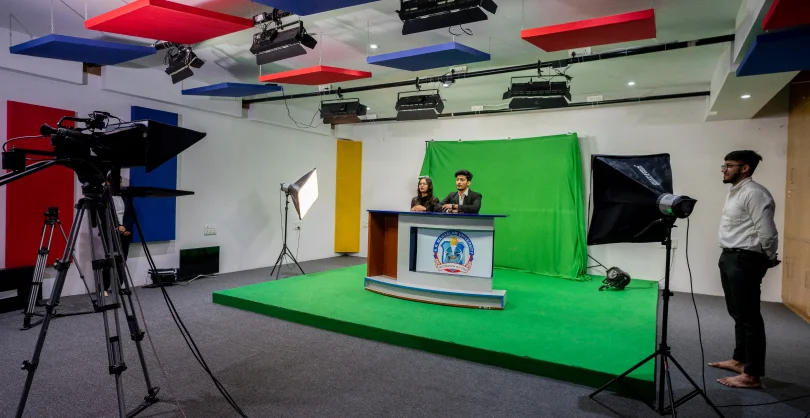OVERVIEW
Our M.A. (Journalism and Mass Communication) programme is your gateway to a dynamic and influential career in the world of media and communication. In an era defined by rapid information dissemination, the ability to craft compelling narratives, communicate effectively, and engage audiences is paramount. This programme equips you with the skills, knowledge, and experiences necessary to thrive in this evolving landscape.

Programme Highlights
Master the Art of
Media Storytelling
The curriculum for the M.A. (Journalism and Mass Communication) programme is carefully crafted to provide students with a comprehensive and contemporary education in the field of media and communication. This dynamic programme covers a wide range of topics and practical skills essential for success in the ever-evolving media industry.
Programme Structure
- Communication Theories and Models
- The Craft of Media Writing
- Current Affairs and Perspective
- Public Relations: Theory and Practice
- Advertising Today
- Exploring Frames
- Exploring Frames Lab
- Reporting and Editing
- Creative Visualisation Techniques
- Creative Visualisation Techniques Lab
- Research Techniques
- Research Techniques Lab
- Broadcast News Production
- Broadcast News Production Lab
- New Media and Web Content
- New Media and Web Content Lab
- Media, Law and Society
- Summer Training Report
- MOOC
- Data Journalism
- Mobile Journalism
- Major Project
- Specialization-I
- Advance Reporting and Editing
- Advance Reporting and Editing Lab
- Business & Political Coverage
- Sports Journalism
- Sports Journalism Lab
- Specialization-II
- Audio Programming
- Audio Programming Lab
- Storytelling for Screen
- Power of Images: TV and Films
- Power of Images: TV and Films Lab
- Specialization-III
- Integrated Marketing Communication
- Integrated Marketing Communication Lab
- Creativity and Campaign Planning
- Creativity and Campaign Planning Lab
- Brand Communication
Connecting Talent to Dream Careers
Our students have the privilege of engaging with renowned media companies, news agencies, advertising firms, digital content platforms, and communication consultancies. These esteemed entities recognize the talent and skills cultivated by our graduates during their academic journey. Through internships, workshops, and collaborative projects, students gain invaluable hands-on experience, ensuring they are well-prepared to contribute to the dynamic field of journalism and mass communication.
Career Options
Our M.A. (Journalism and Mass Communication) programme serves as a launchpad to a multitude of exciting and fulfilling career opportunities in the ever-evolving media and communication landscape. Graduates of this programme are equipped with a versatile skill set that empowers them to excel in various roles at the forefront of the media industry. While the possibilities are vast, here are five key career trajectories, showcasing the diverse prospects available:
Programme
Outcomes
Disciplinary Knowledge:
Knowledge of communication concept, models and theories. Acquiring knowledge of different dimensions of communication, historical, perspectives and other related areas of studies??
01
Understanding the Role of Media:
The media in democratic society, importance of freedom of press and impact of media in general.??
02
Skilled and Industry-ready Professionals:
Strengthening the abilities of a learner by skills, gaining knowledge of the present scenario of M & E industry including advertising, public relations, corporate communication, digital communication, media management.
03
Influential and effective communication:
Influential and effective communication ability to share thoughts, ideas and applied skills of communication in its various perspectives like written communication,?oral?communication?and public communication?etc.
04
Leadership readiness/ Qualities:
To make learners fluent in multiple facets of leadership. Creating the ability & enhancing the qualities to be an efficient leader. Cultivating key characteristics in learners, to be visionary leaders who can inspire the team to greatness.
05
Critical/ Reflective thinking & language efficiency:
Critical/ Reflective thinking ability to employ critical and reflective thinking along with the ability to create the sense of awareness of one self and society.
06
Technologically Efficient Professional:
Capability to use various communication technologies and ability to use various software for content creation, content editing for various forms of publishing platforms.
07
Ethical Awareness:
As a communication learner, one has to understand the importance of ethical values and its application in professional life.
08
Lifelong Learning:
Every graduate to be converted into lifelong learner and consistently update himself or herself with current knowledge, skills and technologies. Acquiring Knowledge and creating the understanding in learners that learning will continue throughout life.
09
Research-related Skills:
A sense of inquiry and investigation for raising relevant and contemporary questions, synthesizing and articulating.
10
Cooperation/ Team work:
Building a team, motivating and inspiring the team members to work up with cooperation to their utmost efficiency.
11
To Demonstrate ability to adapt the rapid changing environment by having learned and applied new skills and new competencies.
01
To acquire the spirit of compassion, kinship and commitment for National Harmony.
02
To progressively adopt and learn continuously through ICT modules.
03
To categorize the various career pathways for students of communication.
04
To educate the students to empower the individuals to promote human rights, human dignity and human freedom.
05
To provide required skills in regard to industries like Advertising, Public Relations, and Corporate Communications etc.
06
To Demonstrate a Systematic, Extensive, and Coherent Knowledge
01
To Demonstrate Procedural Knowledge
02
To Demonstrate Professional and Communication Skills
03
Financial Assistance
K.R. Mangalam University partnered with the leading banks to help you to finance your dream course through Education Loan. You only have to start repaying one year after finishing your course or six months after you get a job.
Frequently Asked Questions
Commence Your Journey
in 6 Simple Steps

Complete payment and submit
Pay the required Application Fee
Take an entrance test
K.R. Mangalam University Entrance Examination (KREE)
Appear for interaction
Attend our Faculty-Led Interview.
Get the admission offer
You will receive the offer letter after the successful interaction
Get Enrolled
Be prepared to embark on your journey










